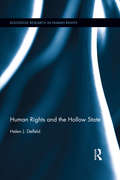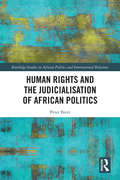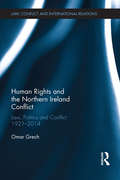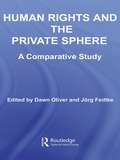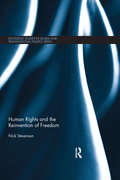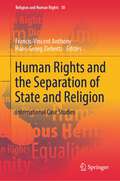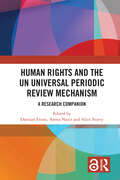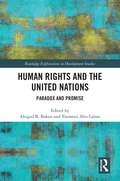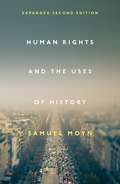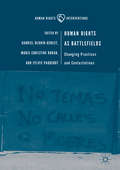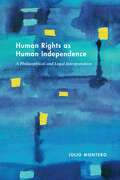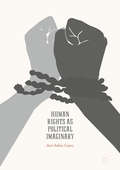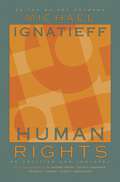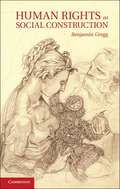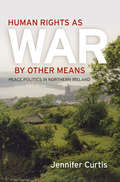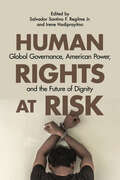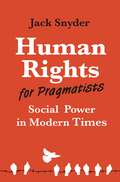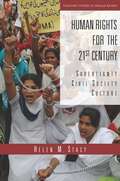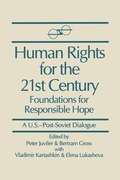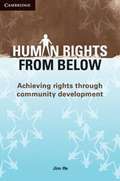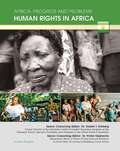- Table View
- List View
Human Rights and the Hollow State: Human Rights And The Hollow State (Routledge Research in Human Rights)
by Helen J. DelfeldThe book investigates the beliefs about governance that determine that state structures are the most appropriate venue for international human rights actors and activists to operate. Helen Delfeld argues that those beliefs rely on a normative perception of a nation-state, not necessarily applicable to most of the post-colonial world. While most post-colonial states may appear to demonstrate the trappings of modern nation-statehood, these projects are mostly spurred by and benefit an elite class. At the same time, there may be little identification with their government among the grassroots polity. Delfeld focuses on the Philippines as an example of a post-colonial state, using nested case studies to show how people think differently about the state at different scales. Following a two-pronged approach, she investigates key moments of state action or inaction, and then asks people at the grassroots about their perspectives on governance, their engagement with the state, and their views of human rights. Her findings indicate that people at the grassroots rely on alternative forms of governance, often in the form of NGOs, INGOs, local cooperatives, informal networks, or structures that pre-date both colonization and independence. Her research also indicates the possibility that some of the most effective human rights actors do not rely on the state, as demonstrated by comparing locally-generated campaigns aimed at promoting environmental rights with state campaigns that address violence against women. The Hollow State and Human Rights shows that rights initiatives misdirected through a "hollow state" might strengthen the mechanisms of the state, but might not actually create a more attentive nation-state. Human rights activists and actors may be far more effective by accessing local structures directly, the practical implications of which go beyond the Philippines to other post-colonial states.
Human Rights and the Judicialisation of African Politics (Routledge Studies in African Politics and International Relations)
by Peter BrettHuman Rights and the Judicialisation of African Politics shows readers how central questions in African politics have entered courtrooms over the last three decades, and provides the first transnational explanation for this development. The book begins with three conditions that have made judicialisation possible in Africa as a whole; new corporate rights norms (including the expansion of indigenous rights), the proliferation of new avenues for legal proceedings, and the development of new support structures enabling litigation. It then studies the effects of these changes based on fieldwork in three Southern African countries – Zimbabwe, Namibia and Botswana. Examining three recent court cases involving international law, international courts and transnational NGOs, it looks beyond some of international relations’ established models to explain when and why and legal rights can be clarified. This text will be of key interest to scholars and students of African politics and human rights, and more broadly to international relations and international law and justice.
Human Rights and the Negotiation of American Power
by Glenn MitomaThe American attitude toward human rights is deemed inconsistent, even hypocritical: while the United States is characterized (or self-characterized) as a global leader in promoting human rights, the nation has consistently restrained broader interpretations of human rights and held international enforcement mechanisms at arm's length. Human Rights and the Negotiation of American Power examines the causes, consequences, and tensions of America's growth as the leading world power after World War II alongside the flowering of the human rights movement. Through careful archival research, Glenn Mitoma reveals how the U.S. government, key civil society groups, Cold War politics, and specific individuals contributed to America's emergence as an ambivalent yet central player in establishing an international rights ethic.Mitoma focuses on the work of three American civil society organizations: the Commission to Study the Organization of Peace, the National Association for the Advancement of Colored People, and the American Bar Association--and their influence on U.S. human rights policy from the late 1930s through the 1950s. He demonstrates that the burgeoning transnational language of human rights provided two prominent United Nations diplomats and charter members of the Commission on Human Rights--Charles Malik and Carlos Romulo--with fresh and essential opportunities for influencing the position of the United States, most particularly with respect to developing nations. Looking at the critical contributions made by these two men, Mitoma uncovers the unique causes, tensions, and consequences of American exceptionalism.
Human Rights and the Northern Ireland Conflict: Law, Politics and Conflict, 1921-2014 (Law, Conflict and International Relations)
by Omar GrechThis interdisciplinary book explores the Northern Ireland conflict through a human rights framework. The book examines the conflict from the creation of the Northern Ireland state in 1921 to 2014. This timeframe allows an analysis of how human rights impacted upon the conflict in its broadest understanding (i.e. the pre-violent conflict, the violent conflict and the post-violent conflict phases). Furthermore, it allows for a better understanding of how the various stages of the conflict impacted upon how human rights are understood in Northern Ireland today. The study’s main findings are that: (i) human rights had a significant impact on the development of the conflict; (ii) human rights violations were both underlying causes and direct causes of the descent into violence; (iii) the conflict coloured the view of human rights held by the main political actors; and (iv) human rights continue to be partially understood through the prism of the conflict. More generally, this interdisciplinary work explores the relationship between law, politics and conflict. This book will be of much interest to students of human rights, conflict resolution, British politics, law and security studies.
Human Rights and the Private Sphere vol 1: A Comparative Study (UT Austin Studies in Foreign and Transnational Law)
by Jörg Fedtke Dawn OliverParticularly valuable for both academics and practitioners, Human Rights and the Private Sphere: A Comparative Study analyzes the interaction between constitutional rights, freedoms and private law. Focusing primarily on civil and political rights, an international team of constitutional and private law experts have contributed a collection of chapters, each based around a different jurisdiction. They include Denmark, France, Germany, India, Ireland, Israel, Italy, New Zealand, the UK, the US, the European Convention for the Protection of Human Rights and Fundamental Freedoms and the European Union. As well as exploring, chapter by chapter, the key topics and debates in each jurisdiction, a comparative analysis draws the sections together; setting-out the common features and differences in the jurisdictions under review and identifies some common trends in this important area of the law. Cross-references between the various chapters and an appendix containing relevant legislative material and translated quotations from important court decisions makes this volume a valuable tool for those studying and working in the field of international human rights law.
Human Rights and the Reinvention of Freedom (Routledge Studies in Global and Transnational Politics)
by Nick StevensonThis volume seeks to propose a reinvention of freedom under contemporary conditions of globalization, cross-border mobility, and neo-liberal dominance. There are currently two predominant myths circulating about freedom. The first is that in a global age growing numbers of citizens are less concerned with freedom than they are with security. Secondly, there is the presumption that freedom only refers to market freedom and consumerism, implying that the ideas of choice and consumption are interchangeable with ideas of freedom. Stevenson argues that while these arguments are significant, they are deeply misleading. More ‘authentic’ ideas of freedom such as self-realisation, participating in politics and seeking a meaningful life of self-reflection have not been entirely displaced but have instead become reinvented in our global times. The cries of freedom can still be heard in a multitude of places from the Arab Spring to the Occupy Movement and from the protests against European austerity to the current popularity of human rights. Stevenson also argues that the idea of freedom has become increasingly mobile in our interconnected and transnational society. The spaces and places of civil society are more complex in this global age, pushing ideas of freedom far beyond the usual arena of national politics. This volume brings together a diverse range of cultural interpretations in respect of freedom related to the idea of the commons, cosmopolitanism, contemporary documentary cinema and the history of jazz music. Exploring the ways in which notions of freedom are being re-made within the context of the present, and looking more precisely at the current threats to freedom, it will be of interest to students and scholars of globalization, human rights and cultural sociology.
Human Rights and the Separation of State and Religion: International Case Studies (Religion and Human Rights #10)
by Hans-Georg Ziebertz Francis-Vincent AnthonyThis text highlights key aspects of the religion/church-state relationship/debate, and related hitherto marginal topics. The contributions make clear that there is no clear blueprint for an optimal relationship between religion/church and state. Individual states and countries are analysed on the granular level for example, to address mono-religious against poly-religious as well as secular societies. Among others, chapters address education, migration and politics against religion as well as the effect of LGBTQ+ communities on religion and societies. This collected volume appeals to researchers, and students working in religious studies and political science.
Human Rights and the UN Universal Periodic Review Mechanism: A Research Companion
by Alice Storey Damian Etone Amna NazirThe Universal Periodic Review (UPR) is a peer-review mechanism, reviewing all 193 UN Member States’ protection and promotion of human rights. After 10 years of the existence of the UPR mechanisms, this collection examines the effectiveness of the UPR, theoretical and conceptual debates about its modus operandi, and the lessons that can be drawn across different regions/states to identify possible improvements. The book argues that despite its limitations, the UPR mechanism with its inclusive, cooperative and collaborative framework, is an important human rights mechanism with the potential to evolve over time into an effective cooperative tool for monitoring human rights implementation. Divided into three parts, the first focuses on exploring a variety of theoretical approaches to understanding the UPR mechanism. The second part examines specific human rights themes and the relationship between the UPR mechanism and other international mechanisms. Finally, Part III questions implementation and the ways in which states/regional groupings have engaged with the UPR mechanism and what lessons can be learned for the future. The volume will be a valuable resource for researchers, academics and policy-makers working in the area of International Human Rights law, International Organizations and International Relations.
Human Rights and the UN Universal Periodic Review Mechanism: A Research Companion
by Alice Storey Damian Etone Amna NazirThe Universal Periodic Review (UPR) is a peer-review mechanism, reviewing all 193 UN Member States’ protection and promotion of human rights. After ten years of the existence of the UPR mechanism, this collection examines the effectiveness of the UPR, theoretical and conceptual debates about its modus operandi, and the lessons that can be drawn across different regions/states to identify possible improvements.The book argues that despite its limitations, the UPR mechanism with its inclusive, cooperative, and collaborative framework, is an important human rights mechanism with the potential to evolve over time into an effective cooperative tool for monitoring human rights implementation. Divided into three parts, the first part focuses on exploring a variety of theoretical approaches to understanding the UPR mechanism. The second part examines specific human rights themes and the relationship between the UPR mechanism and other international mechanisms. Finally, the third part questions implementation and the ways in which states/regional groupings have engaged with the UPR mechanism and what lessons can be learned for the future.The volume will be a valuable resource for researchers, academics, and policymakers working in the area of international human rights law, international organizations, and international relations. We would like to acknowledge the UPR Academic Network (UPRAN) for bringing together the experts on this project and the University of Stirling for providing funds to facilitate open access dissemination for parts of this output.
Human Rights and the United Nations: Paradox and Promise (Routledge Explorations in Development Studies)
by Yasmeen Abu-Laban Abigail B. BakanThis book considers the complex and contradictory role of the United Nations when it comes to human rights around the world. It depicts the United Nations as a global arena in which state and non-state actors continuously contest issues around human rights. This ongoing contestation simultaneously produces both advances and setbacks when it comes to the rights of stateless populations, women, Indigenous peoples, and racialized people, as well as rights related to health and the environment.Since the 1948 Universal Declaration of Human Rights and throughout various subsequent expansions, conventions and declarations, the United Nations has been central to the development and advancement of human rights as a primary, stated goal of global governance. However, there are various inherent contradictory tensions and challenges embedded in the United Nations promise for human rights. This timely collection investigates the United Nations’ role as knowledge producer, its relation to non-state actors, and the United Nations’ role as a system for grouping sovereign states, where there is uneven buy-in within non-binding agreements and tensions between national sovereignty and human rights. At a time when the world faces existential challenges from climate change to pandemics which disproportionately impact the world’s most vulnerable populations, this book addresses future challenges and possibilities for the United Nations.Human Rights and the United Nations: Paradox and Promise will be an important read for researchers and students across the fields of human rights, political science, international relations, and global development, as well as for United Nations and governmental policy analysts and advisors.
Human Rights and the Universal Periodic Review
by Hilary Charlesworth Emma LarkingThe Universal Periodic Review is an intriguing and ambitious development in human rights monitoring which breaks new ground by engaging all 193 members of the United Nations. This book provides the first sustained analysis of the Review and explains how the Review functions within the architecture of the United Nations. It draws on socio-legal scholarship and the insights of human rights practitioners with direct experience of the Review in order to consider its regulatory power and its capacity to influence the behaviour of states. It also highlights the significance of the embodied features of the Review, with its cyclical and intricately managed interactive dialogues. Additionally, it discusses the rituals associated with the Review, examines the tendency of the Review towards hollow ritualism (which undermines its aspiration to address human rights violations comprehensively) and suggests how this ritualism might be overcome.
Human Rights and the Uses of History
by Samuel MoynWhere did human rights come from? This question, rarely asked before the end of the Cold War, has in recent years become a major focus of historical and ideological strife. In a series of reflective and critical essays, Samuel Moyn engages with some of the leading theorists of human rights, who have been creating a field from scratch without due reflection on the local and temporary contexts of their narratives.Having staked out his owns claims about the postwar origins of human rights discourse in his acclaimed The Last Utopia, Moyn's new volume takes issue with his intellectual opponents--including, especially, those seeking justification for humanitarian intervention.
Human Rights as Battlefields: Changing Practices and Contestations (Human Rights Interventions)
by Gabriel Blouin-Genest Marie-Christine Doran Sylvie PaquerotThis book examines human rights as political battlefields, spaces that are undergoing constant changes in which political conflicts are expressed by a translation process within networks of interactions. This translation, in turn, contributes to modifying the scope and understanding of human rights. Ultimately, these battlefields express the legitimacy encounter of different versions of human rights in contemporary political practices. The volume thus challenges both the tendency to minimize the changing nature of human rights as well as the struggles emerging from the use of human rights discourses as a legitimization tool. By shifting the focus on what stakeholders do instead of solely on the origin, nature or foundations of human rights, the authors reveal that human rights are not static objects: they are constantly transformed and, as such, affect the horizon of universal rights.
Human Rights as Human Independence: A Philosophical and Legal Interpretation (Pennsylvania Studies in Human Rights)
by Julio MonteroCan human rights be claimed against agents other than states, such as transnational corporations and global governance institutions? Does the authority of human rights depend on international law-making, or do they have a moral status that must be honored even in the absence of legal structures? What obligations do human rights impose on states acting across borders? What does it mean that the international community must work together to bring about their universal realization? Do we have human rights to abortion, same-sex marriage, and fully democratic government? What must individuals do for the human rights of others?Although these questions may be essential for the future of global politics and international relations, human rights doctrine offers no conclusive answers for them. In Human Rights as Human Independence, Julio Montero develops an original theory of human rights that helps us think about these and similar issues. Montero argues that human rights regulate the conduct of sovereign political agents both within and beyond borders, and that the aim of human rights norms is to protect everyone's fundamental moral claim to enjoy an equal sphere of agency to develop their personality.Human Rights as Human Independence offers a comprehensive, systematic, and complete account of the nature, sources, and scope of human rights that can be used to interpret international documents and make informed decisions about how human rights practice must be continued in the years to come. The book is thus of interest for a wide audience, ranging from philosophers and political theorists to lawyers, human rights scholars, and activists.
Human Rights as Political Imaginary
by José Julián LópezIn this book, López proposes the ‘political imaginary’ model as a tool to better understand what human rights are in practice, and what they might, or might not, be able to achieve. Human rights are conceptualised as assemblages of relatively stable, but not unchanging, historically situated, and socially embedded practices. Drawing on an emerging iconoclastic historiography of human rights, the author provides a sympathetic yet critical overview of the field of the sociology of human rights. The book addresses debates regarding sociology’s relationships to human rights, the strengths and limits of the notion of practice, human rights’ affinity to postnational citizenship and cosmopolitism, and human rights’ curious, yet fateful, entanglement with the law. Human Rights as Political Imaginary will be of interest to students and scholars across a range of disciplines, including sociology, politics, international relations and criminology.
Human Rights as Politics and Idolatry (The University Center for Human Values Series #26)
by Michael IgnatieffMichael Ignatieff draws on his extensive experience as a writer and commentator on world affairs to present a penetrating account of the successes, failures, and prospects of the human rights revolution. Since the United Nations adopted the Universal Declaration of Human Rights in 1948, this revolution has brought the world moral progress and broken the nation-state's monopoly on the conduct of international affairs. But it has also faced challenges. Ignatieff argues that human rights activists have rightly drawn criticism from Asia, the Islamic world, and within the West itself for being overambitious and unwilling to accept limits. It is now time, he writes, for activists to embrace a more modest agenda and to reestablish the balance between the rights of states and the rights of citizens. Ignatieff begins by examining the politics of human rights, assessing when it is appropriate to use the fact of human rights abuse to justify intervention in other countries. He then explores the ideas that underpin human rights, warning that human rights must not become an idolatry. In the spirit of Isaiah Berlin, he argues that human rights can command universal assent only if they are designed to protect and enhance the capacity of individuals to lead the lives they wish. By embracing this approach and recognizing that state sovereignty is the best guarantee against chaos, Ignatieff concludes, Western nations will have a better chance of extending the real progress of the past fifty years. Throughout, Ignatieff balances idealism with a sure sense of practical reality earned from his years of travel in zones of war and political turmoil around the globe. Based on the Tanner Lectures that Ignatieff delivered at Princeton University's Center for Human Values in 2000, the book includes two chapters by Ignatieff, an introduction by Amy Gutmann, comments by four leading scholars--K. Anthony Appiah, David A. Hollinger, Thomas W. Laqueur, and Diane F. Orentlicher--and a response by Ignatieff.
Human Rights as Social Construction
by Benjamin GreggMost conceptions of human rights rely on metaphysical or theological assumptions that construe them as possible only as something imposed from outside existing communities. Most people, in other words, presume that human rights come from nature, God or the United Nations. This book argues that reliance on such putative sources actually undermines human rights. Benjamin Gregg envisions an alternative; he sees human rights as locally developed, freely embraced and indigenously valid. Human rights, he posits, can be created by the average, ordinary people to whom they are addressed and that they are valid only if embraced by those to whom they would apply. To view human rights in this manner is to increase the chances and opportunities that more people across the globe will come to embrace them.
Human Rights as War by Other Means: Peace Politics in Northern Ireland (Pennsylvania Studies in Human Rights)
by Jennifer CurtisFollowing the 1998 peace agreement in Northern Ireland, political violence has dramatically declined and the region has been promoted as a model for peacemaking. Human rights discourse has played an ongoing role in the process but not simply as the means to promote peace. The language can also become a weapon as it is appropriated and adapted by different interest groups to pursue social, economic, and political objectives. Indeed, as violence still periodically breaks out and some ethnocommunal and class-based divisions have deepened, it is clear that the progression from human rights violations to human rights protections is neither inevitable nor smooth.Human Rights as War by Other Means traces the use of rights discourse in Northern Ireland's politics from the local civil rights campaigns of the 1960s to present-day activism for truth recovery and LGBT equality. Combining firsthand ethnographic reportage with historical research, Jennifer Curtis analyzes how rights discourse came to permeate grassroots politics and activism, how it transformed those politics, and how rights discourse was in turn transformed. This ethnographic history foregrounds the stories of ordinary people in Northern Ireland who embraced different rights politics and laws to conduct, conclude, and, in some ways, continue the conflict—a complex portrait that challenges the dominant postconflict narrative of political and social abuses vanquished by a collective commitment to human rights. As Curtis demonstrates, failure to critique the appropriation of rights discourse in the peace process perpetuates perilous conditions for a fragile peace and generates flawed prescriptions for other conflicts.
Human Rights as a Way of Life: On Bergson's Political Philosophy
by Alexandre LefebvreThe work of Henri Bergson, the foremost French philosopher of the early twentieth century, is not usually explored for its political dimensions. Indeed, Bergson is best known for his writings on time, evolution, and creativity. This book concentrates instead on his political philosophy—and especially on his late masterpiece,The Two Sources of Morality and Religion—from which Alexandre Lefebvre develops an original approach to human rights. We tend to think of human rights as the urgent international project of protecting all people everywhere from harm. Bergson shows us that human rights can also serve as a medium of personal transformation and self-care. For Bergson, the main purpose of human rights is to initiate all human beings into love. Forging connections between human rights scholarship and philosophy as self-care, Lefebvre uses human rights to channel the whole of Bergson's philosophy.
Human Rights at Risk: Global Governance, American Power, and the Future of Dignity
by Jeffrey Davis Emilie M. Hafner-Burton Alice Storey Salvador Santino Regilme Dahlia Simangan Eduard Jordaan Mark Eccleston-Turner Oumar Ba Irene Hadiprayitno Dinna Prapto Raharja Ka Lok Yip Hans-Martien ten NapelHuman Rights at Risk brings together social scientists, legal scholars, and humanities scholars to analyze the policy challenges of human rights protection in the twenty-first century. The volume is organized based on three overarching themes that highlight the challenges and risks in international human rights: international institutions and global governance of human rights; thematic blind spots in human rights protection; and the human rights challenges of the United States as a global and domestic actor amidst the contemporary global shifts to authoritarianism and illiberal populism. One of the very few books that offer new perspectives that envision the future of transnational human rights norms and human dignity from a multidisciplinary perspective, Human Rights at Risk comprehensively examines the causes and consequences of the challenges faced by international human rights. Scholars, students, and policy practitioners who are interested in the challenges and reform prospects of the international human rights regime, United States foreign policy, and international institutions will find this multidisciplinary volume an invaluable guide to the state of global politics in the twenty-first century.
Human Rights for Pragmatists: Social Power in Modern Times (Human Rights and Crimes against Humanity #48)
by Jack SnyderAn innovative framework for advancing human rights Human rights are among our most pressing issues today, yet rights promoters have reached an impasse in their effort to achieve rights for all. Human Rights for Pragmatists explains why: activists prioritize universal legal and moral norms, backed by the public shaming of violators, but in fact rights prevail only when they serve the interests of powerful local constituencies. Jack Snyder demonstrates that where local power and politics lead, rights follow. He presents an innovative roadmap for addressing a broad agenda of human rights concerns: impunity for atrocities, dilemmas of free speech in the age of social media, entrenched abuses of women’s rights, and more.Exploring the historical development of human rights around the globe, Snyder shows that liberal rights–based states have experienced a competitive edge over authoritarian regimes in the modern era. He focuses on the role of power, the interests of individuals and the groups they form, and the dynamics of bargaining and coalitions among those groups. The path to human rights entails transitioning from a social order grounded in patronage and favoritism to one dedicated to equal treatment under impersonal rules. Rights flourish when they benefit dominant local actors with the clout to persuade ambivalent peers. Activists, policymakers, and others attempting to advance rights should embrace a tailored strategy, one that acknowledges local power structures and cultural practices.Constructively turning the mainstream framework of human rights advocacy on its head, Human Rights for Pragmatists offers tangible steps that all advocates can take to move the rights project forward.
Human Rights for the 21st Century
by Helen M. StacyIn an effort to defend the necessity of building international human rights institutions, Stacy (Stanford Law School) addresses three broad critiques of international human rights. In response to charges that international human rights is either powerless rhetoric in the face of national interests or perhaps an excuse for colonial or imperial projects that impinge on the sovereignty of nation-states, she argues that a new norm of sovereignty, "relational sovereignty," has emerged in the era of economic and communications globalization and that it requires the sovereign to care for the human rights of its citizens. Against those who argue that civil society is a better vehicle for promoting human rights than international law, she contends that law provides a structure for disagreement, claims, and judgments that can mediate disputes in ways that neither social nor political institutions are able to do. Finally, addressing those that worry about the challenges of cultural difference to universal standards of human rights, she proposes the creation of regional institutions that will be able to offer equilibrium between general international norms and particular cultures. Annotation ©2009 Book News, Inc. , Portland, OR (booknews. com)
Human Rights for the 21st Century: Foundation for Responsible Hope
by Bertram Gross Peter Juviler Vladimir Kartashkin Elena Lukasheva Stanley KatzLeading specialists and activists from Russia and the USA join, in this volume, to offer a searching assessment of human rights in their own countries and in the world at large. They reflect on past history, present problems associated with system breakdown and decline, and the obstacles and opportunities on the way to the realisation of human rights in this uncertain post-Cold War era and the millennium that is now dawning. The participants in the discussions detailed here include Yelena Bonner, Viktor Chkhikvadze, Norman Dorsen, Riane Eisler, David Forsythe, Paula Garb, Charles Henry, Susan Heuman, Irina Lediakh, Vladimir Kudriavtsev, Pavel Litvinov, Richard Schifter, Henry Shue, Evgenii Skripilev, Vladimir Vlashihin, Oleg Vorobiev and the editors.
Human Rights from Below
by Jim IfeIn Human Rights From Below, Jim Ife shows how human rights and community development are problematic terms but powerful ideals, and that each is essential for understanding and practising the other. Ife contests that practitioners - advocates, activists, workers and volunteers - can better empower and protect communities when human rights are treated as more than just a specialist branch of law or international relations, and that human rights can be better realised when community development principles are applied. The book offers a long overdue assessment of how human rights and community development are invariably interconnected. It highlights how critical it is to understand the two as a basis for thinking about and taking action to address the serious challenges facing the world in the twenty-first century. Written both for students and for community development and human rights workers, Human Rights From Below brings together the important fields of human rights and community development, to enrich our thinking of both.
Human Rights in Africa (Africa: Progress and Problems)
by Brian BaughanHuman rights are the fundamental freedoms and privileges to which every individual is entitled. Most people agree that basic rights include the liberty to practice a particular religion, express a political view, or associate with a certain group of people without prejudice, discrimination, or exploitation. Unfortunately, as international organizations like Freedom House have noted, human rights are routinely violated or ignored in many African countries. This book discusses the history behind the as-yet-unfinished struggle to secure fundamental rights and freedoms for all Africans. It also explains the roles that can be played by organizations like the United Nations and the African Union, NGOs such as Amnesty International and Human Rights Watch, and national governments in advancing the cause of human rights.
